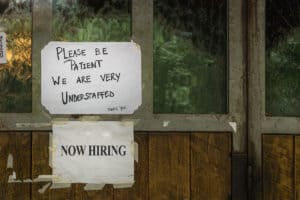 While “long-haul COVID” is a term used to describe the lasting health-related effects associated with coronavirus infections, leaders are also witnessing the potentially long-term effects of the global pandemic on organizations, individuals, and the future of careers.
While “long-haul COVID” is a term used to describe the lasting health-related effects associated with coronavirus infections, leaders are also witnessing the potentially long-term effects of the global pandemic on organizations, individuals, and the future of careers.
It’s an understatement to say that the past two years have had a profound effect on business and people. The news reports daily on the extraordinary stressors present in today’s workplace and the wide-ranging implications of them. And employees are responding to the sustained and challenging conditions in several ways – from leaving altogether, to remaining – but in a diminished capacity, to profoundly re-thinking their relationship with work.
Packing up and leaving
Employees are voting with their feet in record numbers. Another 4.3 million Americans left their jobs in December, only slightly down from November’s record-breaking numbers. Some are simply taking their talents elsewhere, but others are taking their talents out of circulation altogether.
The pressures of caring for others – especially school-age children – during this tumultuous time make working a near impossibility for a lot of parents. And many people have determined that the risks are simply not worth the rewards right now; so, they’re sitting it out and waiting until the current crisis passes.
Staying and stretching beyond limits
Other employees have chosen (or believe they have no choice except) to stay in their jobs. Facing unprecedented levels of attrition, those who remain must pick up the slack and endure extraordinary pressure and expectations. No wonder stress, burnout, and disengagement are at record highs, and the mental health of many is deteriorating.
Re-thinking their relationship with work
Many employees are engaging in deep soul-searching. They’re bringing voice (sometimes for the first time) to questions they might have only silently asked themselves in the past:
- Does this work mean something to me?
- Can I achieve the balance I now can’t live without?
- Am I getting the opportunities I want to grow and learn?
All of these responses to the crises of the past two years have had long-term effects on people and careers. That’s why organizations and leaders must now be prepared to respond in new ways if they want to attract, engage and retain workers. Pre-pandemic strategies won’t be sufficient to thrive in a post-pandemic world. Taking these three steps today can ensure a healthier future.
Stay close
Don’t assume that “goodbye” is forever. Many people feel that they have no choice but to hit the pause button on work or to make a job change right now. But smart organizations will find ways to stay in touch with good employees who have left. And there are plenty of ways to make that happen.
Informal outreach from time to time to see how people are doing. Sharing relevant updates and achievements to perpetuate a sense of involvement and pride. Reunion events. These kinds of efforts create the open door for talent to return when they’re ready – or when the grass turns out to not be quite as green as expected.
Take care
Now is the time to put focused attention and action behind your commitment to caring for your people. They’ve been caring for customers, patients, and the business – frequently bearing the brunt of raw nerves, abject fear, and supply chain disappointments. They need nurturing to remain centered, engaged, and productive.
So, invest in authentic relationships. Prioritize conversation and meaningful communication. Check-in frequently – because the internal personal landscape is as changeable as the external business landscape these days. Identify and offer the services employees need. This might be mental health, wellness, and other resources that keep people whole and say, ‘we care’ and ‘you matter’.
Reimagine careers
The past two years have inspired Covid epiphanies for many. Shifting priorities, the desire for greater flexibility, a commitment to a new kind of balance – all of these have significant implications for careers. That’s why it’s essential for managers to engage differently with employees around career development.
Climbing the corporate ladder may be interesting to some, but many are going to want a different relationship with work, alternatives to traditional advancement, and unique ways to express their talents and make a difference.
As a result, organizations must be prepared to respond to an expanded definition of what careers are and how they’re developed. We must bring greater creativity to helping people learn, grow and develop in ways that are meaningful to them – and that serve their broader lives.
Covid has taken a toll – on communities, businesses, and individuals. We’ll likely be dealing with its long-term effects on health and the economy for some time. But organizations and leaders have the power to heal the long-term effects of Covid on careers by taking action now.
Staying close, taking care and reimagining careers are a prescription for a healthier workforce.
